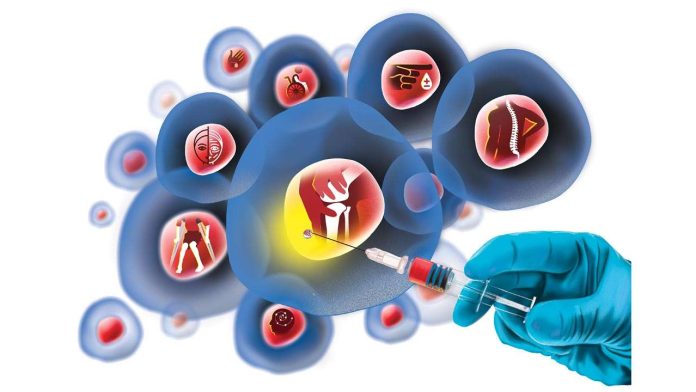Inflammatory bowel disease (IBD), encompassing Crohn’s disease and ulcerative colitis, can be a debilitating condition. It causes chronic inflammation of the digestive tract, leading to a range of uncomfortable and disruptive symptoms. While conventional treatments can manage symptoms and induce remission, they don’t always offer a cure. This is where the exciting field of Stem cell therapy emerges as a potential beacon of hope for IBD patients.
Understanding Stem Cells: The Seeds of Regeneration
Stem cells are the body’s master cells. Unlike most specialized cells with a singular function (like muscle cells or nerve cells), stem cells have the remarkable ability to transform into various cell types. They also possess the power of self-renewal, meaning they can continuously divide and replenish themselves. This makes them a valuable tool for regenerative medicine, with the potential to heal and repair damaged tissues.
Stem Cell Therapy for IBD: A Promising New Approach
Stem cell therapy for IBD is still in its early stages, but research suggests it holds immense promise. The idea behind this therapy is to introduce healthy stem cells into the body to help repair the damaged intestinal lining and modulate the overactive immune response characteristic of IBD.
Two main types of stem cells are being explored for IBD treatment:
- Mesenchymal stem cells (MSCs): These stem cells can be derived from various sources, including bone marrow and adipose tissue. MSCs have potent immunomodulatory properties, meaning they can help calm the overactive immune response that triggers inflammation in IBD.
- Hematopoietic stem cells (HSCs): These are stem cells that can differentiate into various blood cell types. In the context of IBD, HSC therapy aims to reset the immune system by replacing malfunctioning immune cells with healthy ones.
The Potential Benefits of Stem Cell Therapy for IBD
While more research is needed to fully understand the long-term effects, stem cell therapy for IBD offers several potential benefits:
- Mucosal Healing: A hallmark of successful IBD treatment is healing the inflamed and damaged lining of the intestines (intestinal mucosa). Stem cells may promote tissue regeneration and repair, leading to mucosal healing and a significant reduction in symptoms.
- Reduced Inflammation: Chronic inflammation is the root cause of IBD symptoms. Stem cells, particularly MSCs, have the ability to modulate the immune system and suppress inflammation, potentially offering long-term relief.
- Improved Quality of Life: IBD can significantly impact a person’s quality of life. By addressing the underlying inflammation and promoting healing, stem cell therapy has the potential to improve overall well-being and allow patients to lead more active lives.
The Current Landscape of Stem Cell Therapy for IBD
Stem cell therapy for IBD is currently undergoing clinical trials to assess its safety and efficacy. While some studies have shown promising results, more research is required to determine the optimal type of stem cells, dosage, and delivery method for long-term success. Additionally, establishing clear guidelines and regulations for this relatively new therapy is crucial.
Considering Stem Cell Therapy for IBD: What You Need to Know
If you’re interested in exploring stem cell therapy for IBD, it’s important to have a realistic understanding of its current state. Here are some key points to consider:
- Not a Cure (Yet): Stem cell therapy is currently not considered a cure for IBD, but rather a potential treatment option for patients who haven’t responded adequately to conventional therapies.
- Individualized Approach: Like all medical interventions, stem cell therapy needs to be tailored to the specific needs of each patient. Consulting with a qualified gastroenterologist who is familiar with this therapy is essential.
- Ongoing Research: The field of stem cell therapy is constantly evolving. Staying informed about the latest research developments can help you make informed decisions about your treatment options.
A Hopeful Future for IBD Management
Stem cell therapy for IBD offers a glimmer of hope for patients seeking long-term solutions beyond symptom management. While there’s still a journey ahead before this therapy becomes widely available, ongoing research holds immense promise for the future of IBD treatment. By harnessing the body’s own regenerative potential, stem cell therapy has the potential to revolutionize the way we manage IBD, allowing patients to experience a significant improvement in their quality of life.








